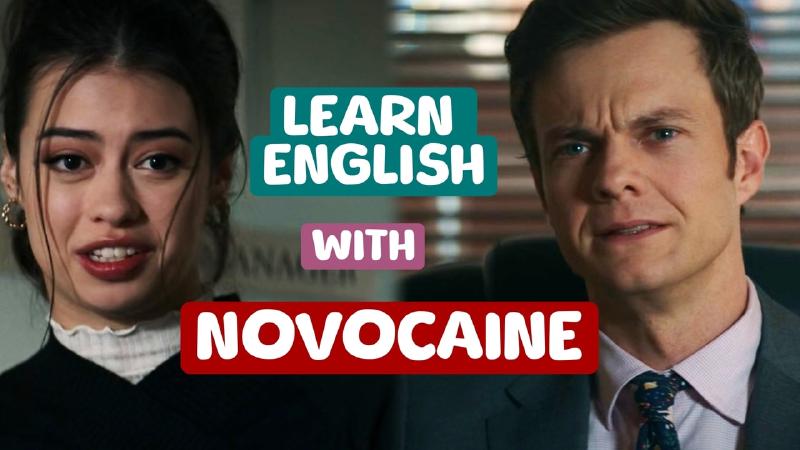Video lesson
Listening practice
Listening practice is only available in the extended version of the lesson on my ☕ BuyMeACoffee page here:
➡️ Check yourself: watch full scene without subtitles:
Welcome
Hi everyone, and welcome back to ‘English Watch and Learn’! In this lesson we’ll look at some everyday English conversations, like apologies, and invitations, in a charming scene from the movie Novocaine. We’ll meet Nate and Sherry here. Let’s watch their interaction.
Learn vocabulary and phrases
Okay, let’s break that down.
Sherry says,
‘Hey, Nate?’
– a casual way to get someone’s attention.
Nate then replies,
‘Hi! Hey, what’s up?’
‘What’s up?’ is a very common, informal greeting, similar to ‘How are you?’ or ‘What’s new?’
When he spills the coffee, she exclaims,
‘Oh, my God! I’m so sorry.’
This is a strong and common way to apologize for a mistake.
Nate replies,
‘Oh, no. That’s fine.’
He’s trying to be polite and make the accident seem less bad than it really is.
Sherry then says,
‘Jesus!’
This is an exclamation of shock or disappointment. It’s quite informal.
Notice the intonation – Sherry’s voice is high-pitched and nervous, while Nate is trying to sound calm.
Nate says,
‘I can take care of that.’
This means ‘I can clean it up’ or ‘I can handle it’. He takes responsibility.
Then,
‘No, really, you don’t have to.’
He’s politely refusing her offer to help, emphasizing it with ‘really’.
Sherry insists,
‘I’m actually really good at getting stains out.’
The word ‘actually’ here adds a bit of emphasis or honesty to her claim. ‘Getting stains out’ means removing marks from clothing.
Nate continues to decline,
‘You actually don’t have to. I’m good.’
Here, ‘I’m good’ means ‘I’m okay’ or ‘I don’t need help.’
Nate talking to himself. ‘Real smooth, idiot.’ ”smooth” here means happening without any sudden changes, interruption, or difficulty. ‘Real smooth’ is used sarcastically here. It means he thinks he handled the situation very un-smoothly or awkwardly. Calling himself an ‘idiot’ is self-deprecating humor or genuine frustration with himself.
Sherry comes to Nate’s office and asks, ‘Am I just so very fired?’. She’s using humor to express her worry that the coffee incident might lead to bad things. ‘Fired’ means losing your job.
Sherry wants to make up for the spill: ‘I feel like I at least owe you a new shirt.’ ‘To owe someone something’ means you feel that you must to give them something in return for damage or a favor.
Nate makes the ruined shirt less important: ‘It’s the worst shirt I have.’ This is a common way to make someone feel less guilty.
Sherry then suggests,
‘Maybe I could take you to lunch?’
This is an informal way to invite someone out and offer to pay.
Nate hesitates:
‘Uh, yeah. Uh, no, actually.’
This shows his internal conflict. He then politely declines,
‘Sorry, I brought mine today, so I’m okay.’
He gives a reason for declining.
Sherry says, ‘No pressure.’ This means she’s not trying to force him. ‘If you change your mind, let me know’ is a polite way to leave the offer open.
Nate calls out, ‘Hey, uh… You know what? I’m in.’ ‘You know what?’ is a common way to start a conversation or introduce a new idea. ‘I’m in’ means ‘I accept’ or ‘I’ll do it.’
Sherry replies,
‘Cool. Leave in ten?’
‘Cool’ is an informal way to say ‘great’ or ‘okay.’ ‘Leave in ten?’ is short for ‘Shall we leave in ten minutes?’
Nate enthusiastically agrees,
‘Yeah! Sounds good.’
Then,
‘Looking forward to it!’
This is a common phrase to express excitement about a future plan.
Nate says,
‘Don’t say that so loud,’
This adds a not serious, humorous end to their conversation.
And that sets up their first ‘date’!
Alright, great job! I hope you enjoyed learning English with Nate and Sherry. If so, let me know by clicking the like button and leaving a comment. See you next lesson.
Next lesson with ‘Novocaine’
↪️ Next lesson with ‘Novocaine’

